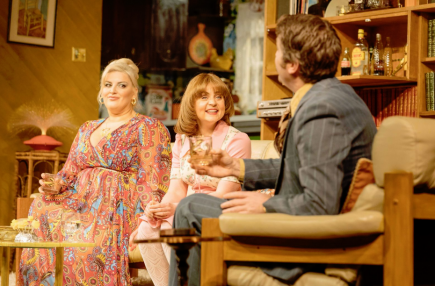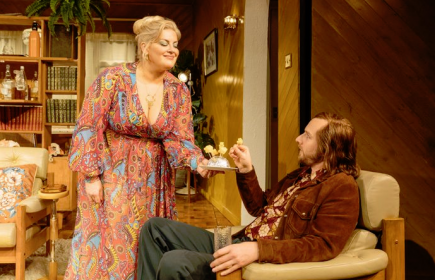Mike Leigh’s 1977 play about a disastrous drinks party in a repressive suburbia has been faithfully recreated by Sarah Esdaile, adding a layer of nostalgia to the much-loved comedy of manners.
An oft-repeated television performance of the original play created a sort of time capsule, and Esdaile’s production of Abigail’s Party – no showing at Opera House, Manchester – celebrates its 70s setting.
While she wisely chose not to add in contemporary references or knowing glances to the audience that would have detracted from the tension of Leigh’s narrative, the period details was entertaining in itself.
A world of Demis Roussos, cheese and pineapple on sticks and £21,000 houses sparked chuckles of recognition from parts of the audience and a sense of “what were they thinking” from those too young to remember.
What was incidental and commonplace when the play was first performed is now evocative and steeped with meaning, and the flared trousers, drinks cabinet and the brown and beige set all neatly reflect the party’s claustrophobic nature.

This preservation of the original extended to attitudes and language less fondly remembered, and jokes about dutiful wives and grown men preying on teenage girls receive a more muted response than perhaps they would have done in 1977.
Abigail’s Party is more than a nostaglia-fest, though, and its exploration of class, relationships and forced politeness are just as relevant more than 40 years on.
The repressed anger from each of the characters creates an enthralling narrative and as the tension rises their terse “no, thank you” responses just get funnier.
With just five characters and a single scene, the play relies on performances that show the nuances of each personality clearly, and here the cast are each able to show just enough emotion to engage the audience while maintaining their characters’ pretence and civility.
Leigh based the characters in part on improvisation from the original cast, with each of them bar Sue reprising the roles for the television play. That solidified their performances and forces any new production to tread a fine line between recreating or redefining the characters.
None more so than Beverly, so closely associated with Leigh’s then-wife Alison Steadman in the original. This time round Jodie Prenger holds her own as the dominating hostess, able to raise a laugh from her opening dance around the living room to her emotional outburst at the end.

Beverly talks and moves more than any other character and Prenger does both with a heartless swagger that is warmly received by the audience. Her taunts towards her husband Laurence feel spontaneous and biting, and Daniel Casey builds up his character’s tense and frustrated nature in an equally convincing manner.
Beverly’s confidence contrasts with her submissive and tactless new neighbour, Angela, played by Vicky Binns. She veers between cheery and helpless as the party progresses, with Binns capturing both sides of her personality to great effect, and her awkward dancing receives one of the biggest laughs of the night.
Calum Callaghan puts in a solid performance as her husband Tony, recovering well from a fit of giggles midway through the second act which threaten to break up his stern character.
Sue, the middle-class neighbour whose daughter Abigail hosts a party apparently far more successful than Beverly’s, introduces another layer of awkwardness to the gathering. Rose Keegan’s facial expressions were effective, although her delivery of every line in the same manner and with the same nod of the head feels a little too wooden.
That said, Abigail’s Party is all about stilted, forced conversation, and as the sedentary dialogue of the first act gives way to a more physical and emotional second half the comedy and the drama grow ever more closely entwined to create an entertaining rollercoaster of an evening.
*Abigail’s Party is showing at Opera House, Manchester until Saturday, April 13. You can buy tickets HERE.



